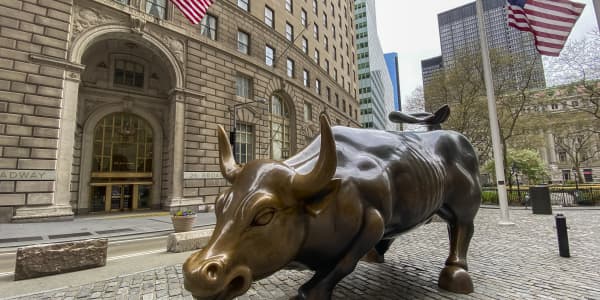This report is from today's CNBC Daily Open, our new, international markets newsletter. CNBC Daily Open brings investors up to speed on everything they need to know, no matter where they are. Like what you see? You can subscribe here.
Investors are selling before the monthly U.S. jobs report.
What you need to know today
- Markets are holding their breath for Friday's big payroll report.
- Economists expect the United States to have added 225,000 in new jobs in February, the unemployment rate to remain at a 54-year low of 3.4% and hourly earnings to rise by 4.8% year over year. If their forecast is right, it will increase chances of a half-point rate hike from the Federal Reserve.
- U.S. stocks had a bad Thursday: all three major indexes fell, with the banking sector in the S&P 500 doing especially badly. European markets traded lower, but not as drastically. The pan-European Stoxx-600 edged lower by 0.19%, helped by a 0.58% increase in food and beverage stocks.
- Cryptocurrency prices fell after Silvergate Bank announced its liquidation. As of publication time, Bitcoin dropped 8.04% to $20,291, and Ether lost 8.12% to trade at $1,430.56. Crypto businesses can still transact with Signature Bank, but the company is planning to limit its crypto exposure.
- The U.S. has managed to persuade the Netherlands to restrict exports on semiconductor components to China. The Netherlands is home to ASML, a company behind machines crucial to manufacturing advanced semiconductors.
- PRO Major indexes have been struggling to break out of a bear market. But several stocks are shrugging off fears and surging to all-time highs — with one 34.3% higher year to date, CNBC Pro discovered.
The bottom line
Investors are getting noticeably jittery about the state of the economy. Banks stocks, which serve as indicators of how the economy is doing, sold off sharply Thursday.
SVB Financial, parent of tech-focused Silicon Valley Bank, plunged 60.41% after the company announced it was raising more than $2 billion in new capital to offset losses. Regional banks got slammed by the news. For instance, PacWest Bancorp sank 25.45%, a 52-week low, and First Republic Bank dropped 16.51% to trade at a 3-year low. Major banks weren't spared: Bank of America and Wells Fargo both fell by more than 6%.
Those losses pushed down the S&P financial sector 4.1% to give it its worst day since June 2020. Unsurprisingly, the S&P ended the day 1.85% lower. The other two major indexes didn't fare any better. The Dow Jones Industrial Average lost 1.66% and the Nasdaq Composite sank 2.05%.
There was a glimmer of good news for investors worried that the Federal Reserve might intensify rate hikes. Initial jobless claims for the week ended March 4 hit 211,000, the highest since Dec. 24, while continuing claims were up 69,000 to a one-year high of 1.72 million. In combination with yesterday's data on layoffs in December rising and wage growth decelerating in February, these data points suggest the labor market might finally be cooling.
Still, economists are predicting February's jobs report will show sustained strength in employment. But remember that everyone thought there would be 187,000 new jobs in January — only to be stunned by the 517,000 that was eventually reported.
Subscribe here to get this report sent directly to your inbox each morning before markets open.





